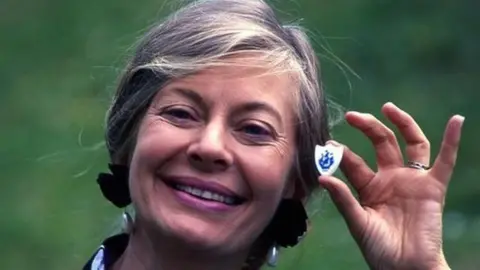**Tribute to Biddy Baxter: The End of an Era for Blue Peter**
In a somber announcement, the broadcasting community mourns the loss of Biddy Baxter, the legendary editor of the iconic children’s television program, Blue Peter, who has passed away at the age of 92. Baxter’s influence extended over two decades, spanning from 1965 to 1988, during which she meticulously crafted the show into a staple of British family entertainment. With her innovative ideas and unwavering commitment, she shaped the childhood experiences of millions.
Baxter, born Joan Maureen Baxter in May of 1933 in Leicester, was not just an editor but a pioneer in children’s television. Her upbringing during the war infused her with a resilience and a resourcefulness that later became hallmarks of the Blue Peter ethos. Her passion for engaging her young audience set her apart; long before interactive viewer participation became common, Baxter championed the need for children to be actively involved in the show.
Under her stewardship, Blue Peter transcended mere television programming. This creative platform emphasized crafts, charity appeals, and animal companionship, promoting a sense of community among its viewers. Baxter’s signature elements like on-screen pets and the now-famous Blue Peter badge created a unique connection, allowing generations of children to experience the joys of creativity and compassion.
Despite her significant contribution to children’s entertainment, Baxter was a controversial figure, known for her uncompromising and often formidable nature. Those who worked with her described a working relationship infused with tension. While many revered her as a visionary, others labeled her as a tyrant. Presenters like Peter Purves and John Noakes voiced their frustrations, recalling experiences of intimidation and authority, often feeling stifled under her reign.
Baxter’s early years were marked by academic excellence, having studied at St Mary’s College, Durham University. Initially inclined towards a career in social work, fate led her to the BBC in 1955, where she began her illustrious journey. Her roles in radio gave her the foundational skills that would translate into her future accomplishments in television.
In 1962, Baxter was appointed producer of Blue Peter, a program initially considered a transient endeavor. When she stepped into the role, she faced challenges, with the series’ viewership needing significant revitalization. With her at the helm, ratings initiatives materialized, and her advocacy for better resources resulted in the program’s expansion from a modest 15-minute slot to a prominent twice-weekly airing.
Blue Peter became notable for its empathetic approach, inviting children to contribute ideas and projects, echoing Baxter’s belief that the show should reflect what its young audience wanted. By implementing a viewer-driven ideas framework, Baxter transformed how kids interacted with television, bridging the gap between education and entertainment in a unique fashion.
Her initiatives also manifested in her introduction of various pets, infusing a sense of joy and companionship into the show. Baxter’s innovative integration of pets, such as the beloved Golden Retriever, Goldie, not only added an endearing charm but also established a bond with viewers who cherished these furry friends, often resulting in massive viewer engagement and participation.
As times changed, so did the dynamics of children’s television, and by the late ’80s, Blue Peter began feeling the pressure of newer formats and diversified programming. Baxter’s departure in 1988 was met with mixed emotions, as it marked the end of a golden era for the show. Upon leaving, she received the prestigious Blue Peter Gold Badge and remained a respected figure within the BBC until her formal retirement in 2000.
In recognition of her contributions to television and children’s media, Biddy Baxter left an indelible mark that resonated with audiences well beyond her years on screen. With a special Bafta award in 2013 acknowledging her legacy, Baxter’s influence remains potent, highlighting her belief that television could be a force for good — a platform for inspiration, creativity, and connectivity that has transcended generations.
Ultimately, Biddy Baxter will be remembered not just as the editor behind Blue Peter, but as a driving force in British children’s television, whose work will forever echo in the lives of countless viewers. The broadcasting landscape has lost an icon, yet her legacy will endure through the memories she created and the hearts she touched.











